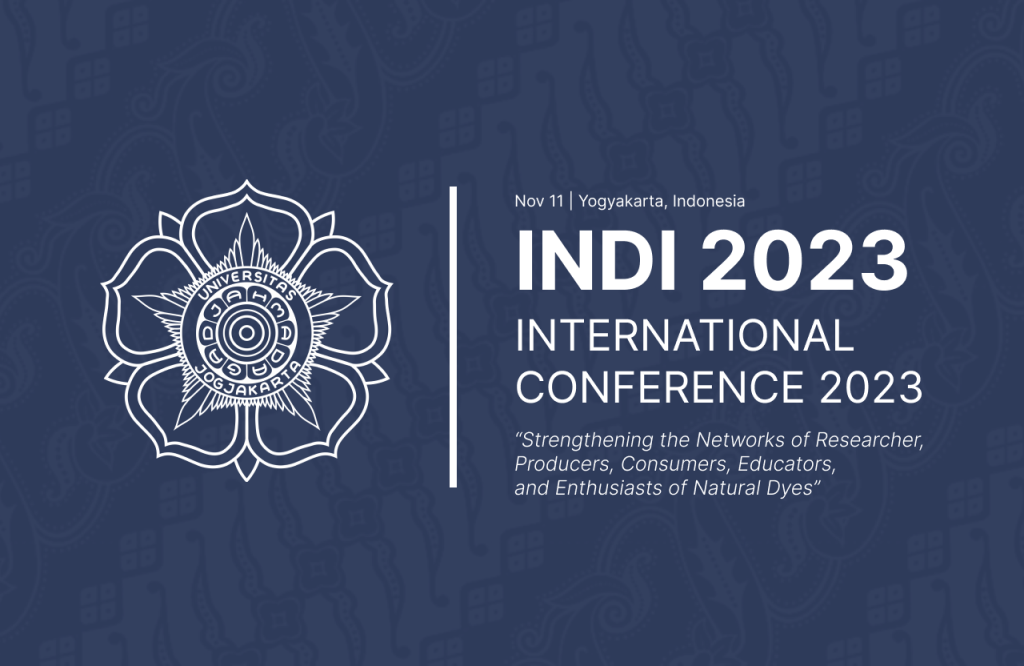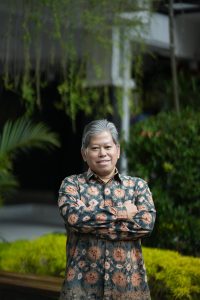
About Indi Conference 2023
INDI UGM invite scholars, practitioners, and students to submit papers to be presented in the INDI UGM International Conference 2023. The theme of the conference is “Strengthening the Network Of Researcher, Producer, Consumers, Educators, and Enthusiasts of Natural Dyes.” The conference will be held on 11 November 2023 from 09.00 to 17.00 in Universitas Gadjah Mada using hybrid method. Selected papers that have been presented will be submitted for possible inclusion to proceedings that are indexed by Scopus.
The conference will cover two subthemes:
A. Natural Dyes in Life Sciences
B. Natural Dyes in Social Sciences
INDI 2023 Invited Speaker

Dr. Ir Sugiura
UNESCO Multisectoral Regional Office for East Asia
(UNESCO Beijing)

Associate Professor Ts. Dr. Abdul Rahman Saili
Universiti Teknologi Mara (UITM)
Sarawak Branch Campus

Associate Professor Perihan Hazel Kaya
Department of Economics, Selcuk University, Turkey

Associate Professor Dr. Sylvia Nabila Azwa Binti Ambad
Faculty of Business Management,
Universiti Teknologi MARA (UiTM) Sabah Branch, Malaysia

Dr. Tossapond Kewprasopsak
Faculty of Economics, Chiang Mai University, Thailand
Introduction
A new way of production and a more sustainable clothes consumption must be implemented to reduce this threat of the fashion and apparel industries to the environment and health. Synthetic dyes are widely known to harm the environment and health. On the other hand, natural dyes have a lesser environmental and health impact than synthetic dyes. Natural dyes are usually renewable, biodegradable, readily available, non-toxic, and have medicinal properties and various tints and shades of different hues. The use of natural dyes also can have socioeconomic impacts. Most natural dyes, especially those from plants, usually come from a labor-intensive industry. This natural dye production provides job opportunities for all those engaged in the cultivation, extraction, and application of these dyes on textiles. Natural dyes generate sustainable employment and income for the weaker section of the population in rural and sub-urban areas, both for dyeing and non-food crop farming to produce plants for the natural dyes.
Using natural dyes is also supporting the effort to combat climate change. One of the natural dye sources is tannin extracted from Mangrove bark. Although mangroves comprise less than one percent of all tropical forests worldwide, the amount of carbon stored beneath these trees is estimated to be up to four times greater than that held by other tropical forests, making these coastal forests extremely valuable in the fight against climate change. Another source of natural dye, indigo, is also already known to have the ability to absorb CO2, which is the leading cause of human-induced global warming.
Leading institution that spearheaded this natural dye development is INDI UGM (Indonesia Natural Dye Institute Universitas Gadjah Mada). Founded in 2019, INDI UGM is also the UNESCO Chair on Research and Education of Local Natural Dyes. As the UNESCO Chair, INDI UGM aims to promote an integrated system of research, teaching, and training, as well as community engagement and communication, and to facilitate collaboration between high-level national and internationally recognized researchers and between national, regional, and global institutions. The position of INDI UGM as the center of excellence was strengthened when INDI UGM became PUI-PT OP (the Center of Excellence in Science and Technology of Indonesia Higher Education) in 2021.
INDI UGM has several objectives as the leading natural dyes institution, especially as the UNESCO Chair. Among those objectives are increasing public knowledge and awareness of the benefits of natural dyes for health and the environment through research and education worldwide, educating potential producers, customers, and enthusiasts to appreciate, be aware of, and be proud of natural dyes by providing knowledge and information at all levels of education, and develop and strengthen networks and collaborations among stakeholders of the natural dyes. To fulfill the above objectives, INDI UGM proposes to hold the International Conference on Natural Dyes, titled “Strengthening the International Network of Researcher, Producers, Consumers, Educators, and Enthusiasts of Natural Dyes.” The international conference is where all stakeholders of natural dyes, current, future, and potential, including the decision-makers, will meet and share knowledge and information on natural dyes. It is expected that during this international conference, there will be an update on all aspects of the development of natural dyes, such as recent analysis on the benefits and advantages of natural dyes, innovation in the production process, new insights on the users and consumers of natural dyes, new educational tools on the teaching of natural dyes in schools, and updated briefing of development and plan from regulators and decision makers of natural dyes. Therefore, this INDI UGM International Conference will further establish and strengthen INDI UGM’s position as UNESCO Chair and provide us with the latest developments and information on natural dyes, which will be very beneficial for the further development of natural dyes.
Topics covered in this conference:
- The history, social and cultural aspects of natural dye
- The Bio Source, technology, and standards of natural dye
- The market, economic value, and supply chain of natural dye
- The future and challenges of natural dye
Steering Committee
Prof. Dr. Ir. Edia Rahayuningsih, M.S. IPU
Head of INDI UGM
Dr. Ai Sugiura
UNESCO Multisectoral
Regional Office for
East Asia (UNESCO Beijing)
Prof. Mustafa Goktug Kaya
Ministry of Treasury
and Finance, Turkey
Associate Professor Perihan Hazel Kaya
Department of Economics,
Selcuk University, Turkey
Dr Tossapond Kewprasopsak
Faculty of Economics, Chiang Mai University, Thailand
Associate Professor Ts. Dr. Abdul Rahman Saili
Universiti Teknologi Mara (UITM)
Sarawak Branch Campus
Associate Professor Dr. Sylvia Nabila Azwa Binti Ambad
Faculty of Business Management,
Universiti Teknologi MARA (UiTM) Sabah Branch, Malaysia
Organizing Commitee

Prof. Catur Sugiyanto
(Faculty of Economics and Business,
Universitas Gadjah Mada)
Head of the Organizing Committee
Call for Papers
INDI UGM invite scholars, practitioners, and students to submit papers to be presented in the INDI UGM International Conference 2023. The theme of the conference is “Strengthening the Network: Consumers, Educators, and Enthusiasts of Natural Dyes.” The conference will be held on 11 November 2023 from 09.00 to 17.00 in Universitas Gadjah Mada using hybrid method.
The subtheme for the conference will be:
A. Natural Dyes and Life Sciences
B. Natural Dyes and Social Sciences
Covering the following topics:
1. The history, social, and cultural aspects of natural dye
2. The biosource, technology, and standards of natural dye
3. The market, economic value, and supply chain of natural dye
4. The future and challenges of natural dye
Extended paper abstract of about 500 words should be submitted online via (insert link) on 15 October 2023
Abstract should consist of background, data and methodology, potential contributions, and keywords. Abstracts must be submitted in English, as also the full paper.
Paper sessions are seminar-style for each paper and ample time for discussion and for participants to provide constructive feedback to authors. Paper presentations will be in English.
Full Paper Format
We recommend the paper includes at least the following sections:
1. Title Page
2. Abstract
3. Introduction (including literature review)
4. Methodology and Data
5. Result
6. Conclusion
7. Reference
8. Appendices (if necessary)
a. Manuscript Submission. Please submit an electronic version in MSWord only in the first instance.
b. Length. Manuscripts should not exceed 8,000 words (including abstract, footnotes and references), plus a maximum of 8-10 tables and figures.
c. Abstract and keywords. An abstract of not more than 150 words should be included, together with 3-5 keywords suitable for online search purposes, chosen from the list provided at the submission site or provided by the author.
d. Layout of Text. Text should be double spaced, times new roman 12. Please follow the following system of headings and subheadings: each major section of the article should be given a brief bold upper-case heading; subsections are indicated by bold sentence case headings, and third-level headings are italicised in sentence case.
e. Citations. Please use the Harvard system. References in the text give the author’s surname, year of publication, and page number if necessary. At the end of the paper, please list the references cited in the text, arranged in alphabetical order of authors’ surnames.
f. Footnotes should be kept to a minimum, both in number and size; they should be numbered consecutively with Arabic numerals and located at the foot of the page on which reference is made to them in the text.
g. Tables should be clearly headed, be numbered consecutively with Arabic numerals, and contain adequate information to allow the reader to understand them without referring to the text. Notes to the table should be placed directly below it, and keyed by superscript lower case Roman letters. Sources of data should be placed at the end of the table.
h. Appendices. Contributors are advised to use an appendix for technical proofs and derivations that can be separated from the main text.
i. Spelling. Authority is the Oxford English Dictionary. Use ‘s’ spelling, e.g. organise.
j. Disclaimer. These instructions are favourable for both authors and readers of the works. Following these instructions are highly recommended.
Program
08.00 – 08.30: Registration
08.30 – 09.00: Opening ceremony
09.00 – 10.30: Plenary Session
10.30 – 10.45: Coffee Break
10.45 – 12.15: Parallel Session I (3 speakers per session)
12.15 – 13.15: Lunch Break
13.15 – 15.15: Parallel Session II (4 speakers per session)
15.15 – 15.30: Coffee Break
15.30 – 16.00: Parallel Session III (3 speakers per session)
Payment
Participan Registration
500,000 IDR
Participan Registration/Non Presenter Registration
250,000 IDR
Important Dates
15 October 2023
Abstract Submission Deadline
23 October 2023
Notification of Abstract Acceptance
28 October 2023
Paper Presenter Registration Deadline
5 November 2023
ExtendedAbstract/Presentation Materials Deadline
10 November 2023
Participant/Non-Presenter Registration Deadline
